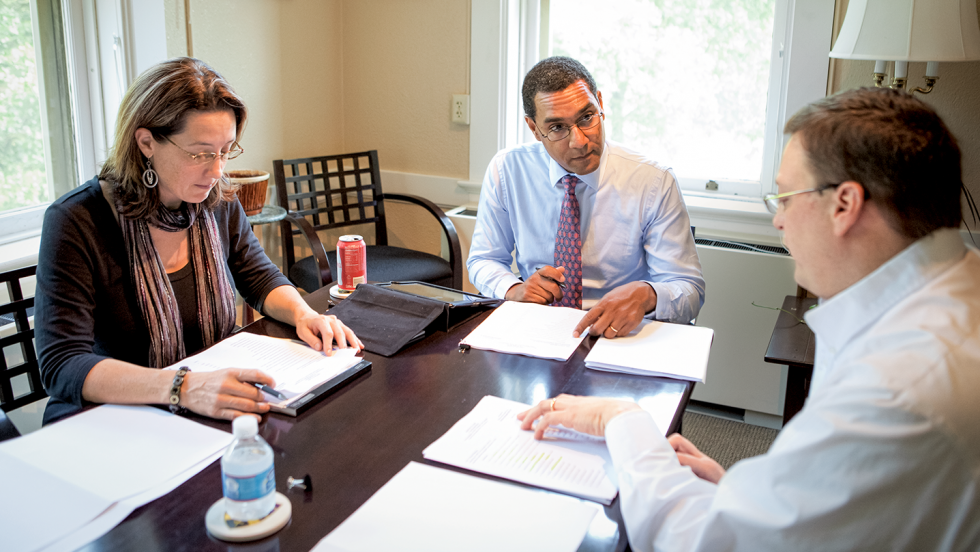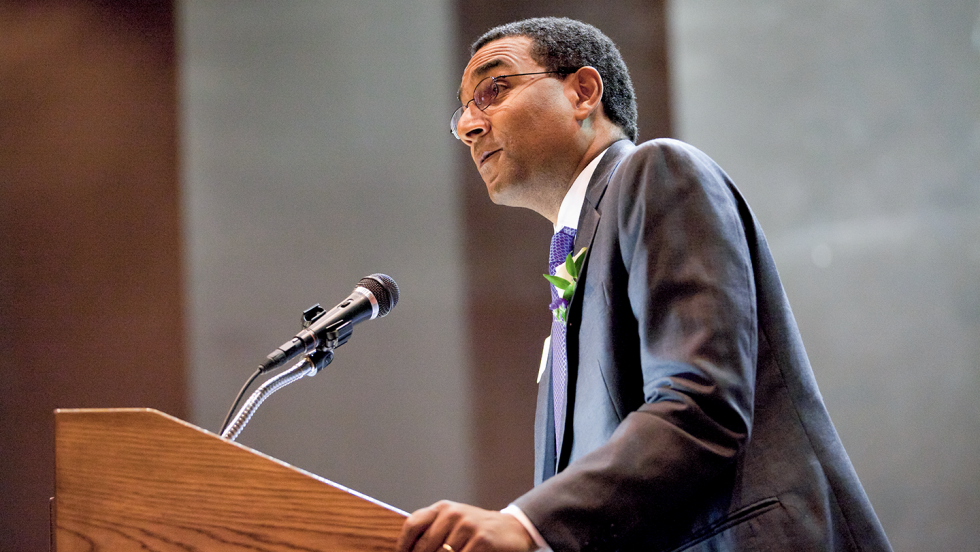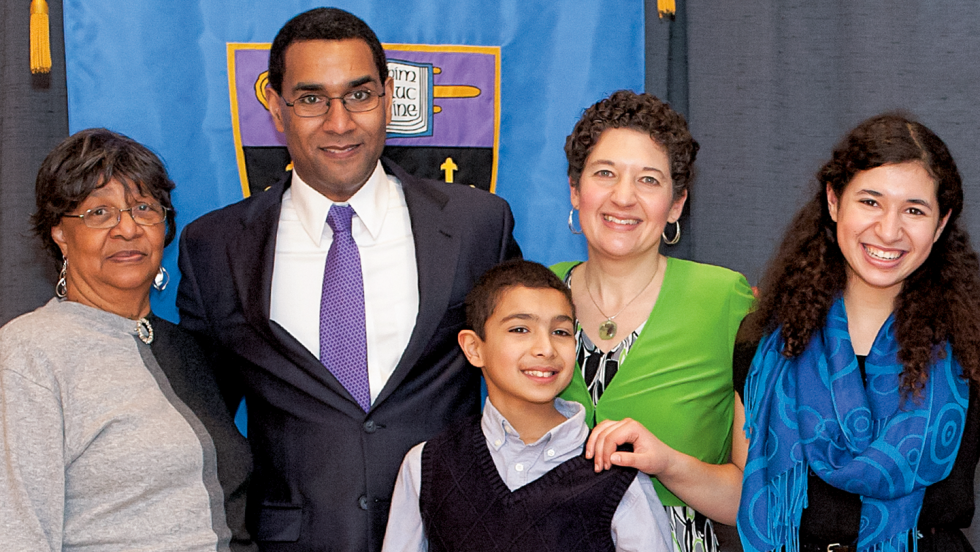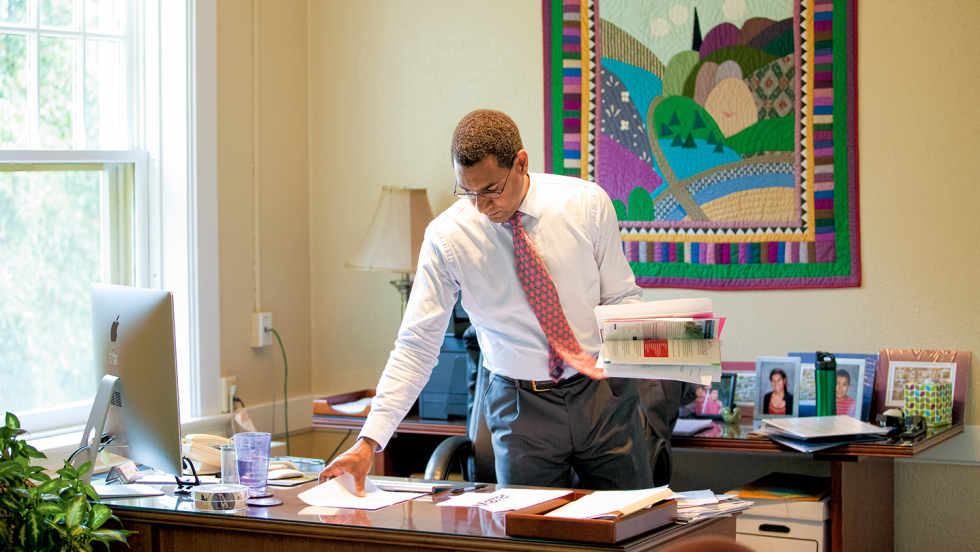How Women Came to Kenyon
Kenyon's first females graduated forty years ago. To mark the occasion, the Bulletin recalls how coeducation came…
Read The StoryBiochemist and Beatles aficionado, Kenyon's new president grew up with the lessons of learning.
Story by Mark Ellis | Photography by John Noltner
The part about the red hills of Georgia, where the sons of the South, black and white, might one day sit together at a table of brotherhood, struck a chord among the faithful in Baptist churches in Cleveland.
The words came from a six-year-old boy, who had memorized the “I Have a Dream” speech of the Rev. Martin Luther King Jr. and whose rendition could move the crowd.
“He was this little guy,” Doris Decatur said. “He got up and did that speech from beginning to end, without stumbling or forgetting it. Everybody knew him—the little boy who does the Martin Luther King speech. He talked about the red hills, and, oh, they had a fit. It was one of those things that brought tears to your eyes.”
It was the proud grandmother of Sean M. Decatur who took him to a handful of churches, and it was his mother, Doris, who recalled those days after her son told her he had been named Kenyon’s nineteenth president. “He needed to have his dream, and he’s getting it here,” she said as she sat in Cromwell Cottage during a recent visit.
Decatur came to Kenyon, at forty-four years old, after a stellar academic career in the liberal arts: biochemistry degree at Swarthmore, doctorate at Stanford, professor of chemistry at Mount Holyoke, dean at Oberlin College. His credentials have been well documented, but Decatur’s early years offer a revealing glimpse into his character.
Doris Decatur worked for nearly forty years in the Cleveland public schools, teaching math and science. She took on other work as well, including writing obituaries for the Cleveland Press. When her son wanted to join the Boy Scouts, she became the troop leader to make it happen. When she saw that he needed a more stimulating education, she sent him to a private school.
“Growing up with a teacher is interesting,” Decatur said. “Education was clearly always part of the conversation, part of life at home. There was an expectation that we would do well in school and work hard. And that was just something that was never up for discussion.
“I think my mom has always been very committed to making sure that her children and now her grandchildren and great-grandchildren get the best possible opportunity for success.”
If Decatur saw an opportunity, he took it and learned from it. His professional rise has been swift and sure, but it’s his modesty that is often mentioned by observers. His colleagues and peers praise his ability to get things done—after reaching consensus. His defense of the liberal arts can be seen in blogs posted with the New York Times and on www.kenyon.edu, fulfilling the promise of a visionary who is nevertheless known for skillful pragmatism.
“He’s been very interested, throughout his career, in the big issues, but he’s very practical,” his wife, Renee Romano, said. “What are the big issues? What are the solutions? If we see a problem, we have to find a way to solve that problem. It’s not just abstract.” Romano, professor of history at Oberlin and a race-relations scholar, has seen in her husband an approach to leadership “cultivated over the years.”




Decatur was born on September 4, 1968—fourteen years after his brother Ron, and ten years after his brother Stephen. His parents divorced before Sean reached school age, and his father is now deceased. Ron has also died.
A typical school night after dinner saw Doris and her children at the dinner table, cleared to make way for books, pencils, and calculators. “The TV was turned off and all of us sat down and that was time for work and school work,” Doris said.
Computers were part of the family equation. “All of the boys in my family were math people, and when the computer came out, that was just up their alley,” their mother said. “The two older boys—one could put together a computer or repair it and the other one had jobs to write the programs. Sean had a computer since he could remember. He had one of those big, old ones. I thought, ‘Isn’t he too little for that?’”
Sean attended public primary schools in suburban Cleveland and in the city, including an elementary school in a largely Asian-American neighborhood. He spent most of his youth in a downtown Cleveland apartment.
He sometimes accompanied his mother to her classroom. “He would kind of help out,” Doris said. “I had the science class and he would come in and they enjoyed it. He would sit down with them and teach them how to measure . . . how to do different things. And when he left, there would be others who would volunteer and say, ‘I think I can do what Sean was doing.’”
She saw something similar when she visited Sean’s elementary classroom. “He would have this little group that he was teaching because he had finished all of his work, and he didn’t have anything else to do. He needed to be challenged.”
By the fifth grade, the family decided to send Sean to Hawken School, a private academy in Gates Mills, and they saved the money to do it. “I told him he would have to make new friends and it’s a long drive over,” Doris said. She drove her son across town to a point where she arranged for other Hawken parents to ferry him the rest of the way. As he grew older, Decatur rode a municipal bus to school.
“He was in his own element then,” Doris said. “He got his challenges and he worked and he enjoyed it.” He rose to the top of his class.
“I certainly was welcomed,” Decatur recalled. “It was definitely a culture shock . . . a school where everyone really had the baseline expectation of doing well. In the end, I did fit in. I eventually found a group who were equally geeky, nerdy friends. We played a lot of Dungeons and Dragons and programmed our little TRS-80 computers to keep track of our Dungeons and Dragons characters.”
He joined a number of student groups, including the Meteorology Club. “You could name a potential nerdy club and I was in it.”
But he also dabbled in soccer and wrestling in school, and was athletic enough to spend hours gliding over the streets and parks of downtown Cleveland on his skateboard.
Leaving those streets behind and reaching Hawken took a forty-five-minute ride on the public bus. Decatur recounted the journey in an essay published in “Rust Belt Chic: The Cleveland Anthology” in 2012. “Five days a week for about six years, the Number 9 bus was a morning and afternoon home away from home, a place where I could finish homework, take a nap, or eat a snack,” he wrote. “Equipped with a teen’s ability to find creative outlets in any environment, downtown Cleveland was a wonderful playground.”
He delighted in bringing his suburban pals into the heart of the gritty city, and he was stung when some Hawken parents balked at sending their children downtown to the prom.
Decatur skipped that prom and went, instead, to the Shaker Heights High School prom with Renee Romano.
They met as rivals in the rarified social climate of debate teams in the comfortable suburban neighborhoods east of Cleveland—and they still debate whether it was sophomore or junior year, and whether Renee invited him to a party at her home or he crashed it.
She concedes Decatur was the more skilled debater, and they did not compete in the same event. “By far, oh gosh, yes. No question,” she said, mentioning that Decatur reached the state level. “He is far more stubborn than I am,” she added. “He will sometimes stop arguing, but he will not stop knowing he is right.”
The debate team was “the big influence” outside the classroom for Decatur at Hawken, he said. “I just loved the notion of making an argument and coming up with things off the top of my head, having to think on my feet,” he said. “At the risk of sounding obnoxious, we were actually a really good team, and I enjoyed it a lot. It was something that was competitive, one of those things that, I think, comes from sports and the arts . . . that notion of performance and the expectation of what comes with performance. That is so incredibly important in shaping how students see themselves, knowing how to push themselves, knowing how to put themselves on the line in front of others. That is a really valuable experience.”
The couple started dating near the end of their senior years and continued through the summer and into college. There—he at Swarthmore, she at Yale—they perfected romance by rail.
“We spent a lot of time on the trains between Philadelphia and New Haven,” he said. “When I pull out an old textbook from the shelf, I still have train tickets that have been used as bookmarks.”
The transfers and stops “took hours and hours,” she said. “He eventually got a car that his brother handed down to him—a pit of a car. I was always dubious about that car.” And the car finally broke down, stranding them in Utah for a couple of days as they drove to Stanford, where they found mutually “top-choice” graduate programs, with Sean studying chemistry and Renee studying history.
They married in 1991, a year into graduate school. “I think that we have always been able to talk and connect about just any subject at all,” Decatur said. “We don’t always agree, but we really enjoy the conversation and discussion. We’ve always had a connection, someone to talk to and engage with. It has been special.”
Romano marvels at her husband’s career arc. “I guess I always knew he was going to accomplish great things. He’s just very quietly accomplished, the kind of kid who turns down Harvard because he can. He wanted to go to Swarthmore because he thought he could get a better education, and he was right.
“He wins the big award at commencement. Major in biochemistry. Minor in black studies. Really wide interests. Well-read. Very smart. He finished Stanford ridiculously early. He’s already a professor at twenty-six and then he’s a full. And then he gets his opportunity for associate dean at Mount Holyoke, and, really, he was just great at it. He took to it. I think he learned, partially from debate and partially from going to a Quaker college where everything was done by consensus, how to get through an agenda without being top-down. He proved to be really good at getting things done,” Romano said.
“You learn how to bridge, how to translate, how to understand different people and how to still create a space for yourself,” she continued. “And you have to be comfortable in your own skin doing that.”
Decatur went to college intent on becoming an engineer, but that interest faded early at Swarthmore. “I fell in love with chemistry,” he said. “It was easier to do a chemistry major yet still engage in a lot of work in the humanities and social sciences.”
Early on, a small seminar in chemistry showed him the value of interacting with faculty and students. “We would do the reading and talk about interesting things and solve hard problems together, and it was this really fun, enjoyable thing,” he said. After another chemistry course, an encouraging professor invited him to consider becoming a teaching assistant. “I had mentors who were taking an interest in me.” The experience underscored his interest in chemistry and propelled his growing appreciation for the liberal arts.
Decatur took advantage of a fledgling Mellon Foundation program, now known as the Mellon Mays Undergraduate Fellowship program, that encourages students of color and first-generation students to consider careers in academics. “I was in the first cohort. One of the things that’s fascinating about this program is that it’s truly interdisciplinary.” An English professor became a mentor and suggested graduate school. “The notion of more school certainly was not on my radar screen,” he said. “I became a chemist because I loved the problems, but it’s one of those fields that it’s pretty clear where your job opportunities are.” An internship with British Petroleum had him leaning toward an industry job.
The Mellon program and the liberal arts culture that brought him in close contact with faculty members inside and outside the classroom—“getting to know what professors did” —awakened him instead to a career in the academic world. “I learned an awful lot about career possibilities but also a lot about the world and how the world worked,” he said.
With his Stanford doctorate in his pocket, Decatur joined the Mount Holyoke College faculty as an assistant professor, teaching chemistry and initiating a research program on protein folding. He brought in funding support from the National Science Foundation and National Institutes of Health that allowed him to build a vibrant laboratory with undergraduate students, typically ten to twelve in the group at a time. Those students routinely presented work at national conferences and published in leading peer-reviewed journals.
“The students learned invaluable problem-solving skills while working on the research team,” Decatur said. “Some have gone on to careers in science or medicine, while some have moved on to law and business. Even as they’ve moved away from protein folding, the fundamental critical thinking and communication skills have served them well.”
As associate dean at Mount Holyoke, he began thinking “on a larger scale how we make the learning experience work.” The move to Oberlin as dean of the College of Arts and Sciences in 2008 was a natural progression. The leap to the Kenyon presidency becomes a beguiling challenge.
“I think certainly there’s a bit of pressure in the sense that I think Kenyon is a great institution and I want to be able to continue that,” Decatur said. “On the other hand, it is all work that I care about and, in some ways, this feels like the right place for me to be.”
Facing this new challenge, Decatur draws on the strength of family, which includes a daughter, Sabine, seventeen, and son, Owen, eleven. His “truly multidimensional” partnership with Romano includes an alignment in career direction and child rearing. “Both of us feel that raising our kids is the most important work that we are doing,” he said, “and we feel very strongly about being engaged and being there for our kids.
“It really is just fascinating watching kids grow up and watching the way they grow up into folks you have conversations with about anything at all.”
The family framework started early for her husband, Romano said. “He came from a really good mother. She raised him with good family values, valuing education and work, and that really played into him wanting to have a strong family life. He wanted to be a good dad.”
Doris Decatur learned about her son’s new job when he arrived on a day in March to take her to see an action film, something mother and son enjoy doing together. “I just gave him a hug, and I told him, ‘I still have your back.’”
What Kenyon can expect, Romano said, is a president who treats all colleagues in the same manner. “Maybe this comes from his upbringing. Maybe it just comes from who he is, but I think it’s an incredibly powerful thing. He respects all kinds of work, and he doesn’t think the kind of work you do decides who you are,” Romano said. “That has really informed his world view. That is really refreshing and wonderful.”
A game of The Beatles Trivial Pursuit can be a long and winding road for anyone fool-on-the-hill enough to take on Sean M. Decatur.
Decatur trounces the rest of his family, even when they play as a team. “We haven’t played too often because it’s just too humiliating,” his wife, Renee Romano, said. “It’s a nightmare.”
His fandom goes back to the Hawken School. “I think it was part of the geeky high school subculture I was in,” Decatur said. “We were pretty obsessed with music and . . . all big classic-rock listeners. It was something that was bonding, something that could bring us together, talking about music.”
And, yes, he casually mentions that “Rain” was the B side of the single “Paperback Writer,” part of the “embarrassing amount of Beatles trivia stuck in my mind.” The context is the unrelenting excellence of the band, that what may have been considered a throw-away song by the Beatles is “actually a well-crafted pop song that gets stuck in your head.” The thread leads to “Revolver” as his favorite Beatles album—the “ultimate in pop craftsmanship” with a tilt toward the group’s mind-expanding experimental phase. No surprise, perhaps, that John Lennon is his favorite Beatle, with George Harrison a close second.
But Decatur’s musical tastes are far-ranging. His first concert was a mid-1980s Akron Rubber Bowl spectacle that included Bob Dylan, Tom Petty and the Heartbreakers, and the Grateful Dead. His most recent venture was Bruce Springsteen at Quicken Loans Arena this year in Cleveland— “a lot of fun.”
The novels and essays of Nick Hornby are a guilty pleasure for Decatur. “He captures that notion of a certain generation where conversations about pop culture in general, but music especially, are ways in which men learn how to communicate with each other,” he said, “in a strange way.”
Those at Kenyon can expect “a lot of pop-culture references” in his speeches, Romano said. “Oh yeah, he likes some cheesy pop culture. One of the most surprising things about Sean is that he goes to really bad movies.” After all, his mother should know. They enjoy the same films. Doris Decatur is a long-standing James Bond film fan and named her third son after the actor Sean Connery.
Kenyon's first females graduated forty years ago. To mark the occasion, the Bulletin recalls how coeducation came…
Read The StoryDiscovering Danville's famous raccoon dinner, a Kenyon student muses on socio-culinary boundaries and the people…
Read The StoryAn immensely complex transplant operation gives a soldier two new limbs. On the team that made it happen: a husband…
Read The Story